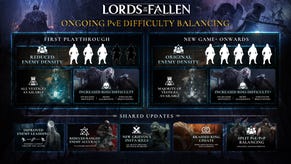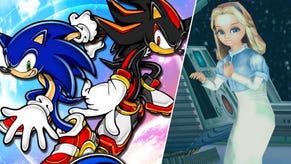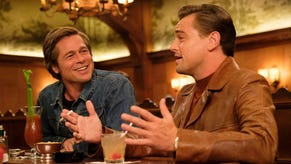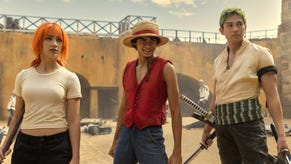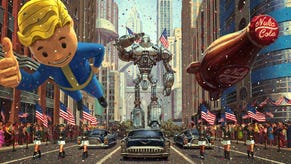Kojima celebrates 25 years of Metal Gear at BAFTA
Hideo Kojima was in London recently to celebrate the 25th anniversary of Metal Gear and to talk about why he is the last of a dying kind. Johnny Cullen reports.
"I still haven't been able to achieve that original image that I had in my head. And until I'm able to achieve that I'll keep on creating games."
I've known about Hideo Kojima's 2012 appearances at Eurogamer Expo and BAFTA since late May. When I was told about it, my immediate reaction was glee and a touch of excitement. Here was the chance to get to see the man who created my favourite series in Metal Gear Solid, and in turn my favourite game ever with Metal Gear Solid 3, talk about the history of the series and its future.
Considering his love of films (he attempts to watch at least one per day), the excitement of talking at the home of British cinema was evident.
"Well, I am a huge movie fan, and I've said in the past that 75% of my existence is movies. So being able to come here and speak here at BAFTA is really a great honour for me," he told presenter Johnny Minkley during the annual BAFTA Games Lecture.
"But of course, I've been watching lots of movies ever since I was young. Movies and novels have really shaped my existence and over the past 25 years I've applied that to Metal Gear Solid. It's really a culmination of all these various movies and influences that have allowed me to create Metal Gear Solid, so it's not one particular work that has really influenced me," he continued, noting the one biggest inspiration for him as a creator was Clockwork Orange.
"It's not so much that I love the story or anything particular about it. It's more just the feeling that I got from it. It was made at a point in time when we hadn't been to the moon yet, and yet it really made people excited about going into space and it gave people dreams and got people thinking."
Kojima's start from the games industry came about after he was unable to successfully break into the movie industry. But he says once got around to the idea of making games, it was relatively straight forward from there, saying they were "fun" to make.
But even after 25 years of making Metal Gear games, as well as having a hands on approach with titles like Zone of the Enders, Boktai, Policenauts and Snatcher, he said he still doesn't have the "perfect" image of a game in his mind.
Noting the stigma that most game-to-movie films have had, he admitted Tomb Raider had been one property that did really well in terms of making the jump from gaming to films.
"As far as sales were concerned," he then added to laughter in the room.
"Needless to say I think most people in the audience know, as far as movies based on games up until this point there haven't been any success stories. I think one of the reasons for that is that games are an interactive medium, so they create a scenario, a setting for the player to interact with but there's not really a compelling story there for a lot of games," he said.
"Hollywood sees the games are popular, they try to pick up and they create a story and try to basically force a story onto that game. It doesn't work, because you end up with something that's neither the game nor a good movie so fans of the original game won't be satisfied and movie lovers won't really be satisfied with it either, so it doesn't really hit any particular target.
"That's the problem that I'm trying to remedy with the upcoming Metal Gear Solid movie, and I'm sure most of you know who's producing it [Avi Arad] and I hope you have confidence in that movie, because I feel it will turn out well."
You won't catch me around here
At the start of the lecture a video was shown of MGS series through the ages, from the original Metal Gear in 1987 to MGS4, the last canon instalment, in 2008, and the upcoming Ground Zeroes.
A clip was shown from The Making of MGS2 documentary that came on the DVD in the original release of Sons of Liberty. In it, he mentioned that he himself used to play hide and seek a lot as a kid and that he played it with his son, which is how he got the idea for the original Metal Gear Solid.
Kojima said even with simple concepts, however, it's important to keep innovating.
"If you look at a lot of the games out there there are a lot of first person shooters based on sci-fi space battles, or aliens, things like that, it's very common. I do think that it's because there is a marketplace for those type of games. People keep on buying them.
"But I think it is important to keep an eye on that marketplace, and aim to please them but do something new within those boundaries. That's something that I feel I have to struggle to accomplish as well."
Hideo Kojima is one of few names from games compared to those of film creators such as Steven Spielberg and Stanley Kubrick. But, and perhaps just a touch controversially, he said he's the last of a a dying kind.
"As explained previously I do come up with the game concept, manage the design, the gameplay, the presentation and everything else," he said.
"So from that point of view I guess you could say yes, I could be considered an auteur in that sense. But that said I do think that that particular style of game creation is very much like an indie film. It's very unusual and I think games from this point on are getting bigger with higher budgets, just huge games.
"There really is no choice but to split things up at a certain point, and I think the auteur concept in games is a dying breed and I'm afraid that probably my generation will be the last that can make that claim."
On the subject of his son, Kojima made the point that having a child definitely changed the way on how he'd design games.
"I find myself thinking about what will happen after I'm gone from this world, what will I leave for the next generation and what can I do to have a positive influence on them?
"So rather than just creating a game where you just kill time or have fun with it, of course that's important, but I also want to do something that's useful to the next generation, that's useful to the people who play it and really think about what kind of influence it will have on them and their lives.
"After becoming a father that's become something that I think about a lot."
True patriotism
Of course, the main point of the lecture was to celebrate the 25th anniversary of the Metal Gear series. At the end, we got a quick look at the shorter demo of Metal Gear Solid: Ground Zeroes than what was shown the day before at Eurogamer Expo.
Kojima said that he's still trying to achieve his vision.
"If you're going to create a piece of art the first image is in your head. And that original image popped into my head 25 years ago. For 25 years I've been trying to recreate that image in the form of a game.
"The amount of tools I have available to me has changed, it's increased. I have more colours available to me in my palette, I have more tools available to me. But I still haven't been able to achieve that original image that I had in my head. And until I'm able to achieve that I'll keep on creating games."
Kojima has said that last line for the most part of his career. For the most part, I'll keep buying his games as long as he makes them. Metal Gear Solid 3 was a big influence in choosing my career choice because of The Boss's story. I've always wanted to see her story fleshed out in a broader way.
I finally got to talk to a man who, personally speaking, I have at the top of an interview bucket list as a journalist. There was only one question to ask to someone who inspired me, in a way, to become a games journalist.
"Hi, I'm Johnny Cullen, freelance," I say to Kojima and his translator, Kojima Productions producer Sean Eyestone.
"First off, I have to say that Metal Gear Solid 3 is one of the main reasons I wanted to become a games journalist and I thank you for that. One of the main reasons MGS3 is my favourite game ever is because of The Boss character. And you've said in the past that if outside the Snakes, you'd like to make a game based on The Boss or the Cobras."
With my hands literally shaking and legs trembling in nervousness - not kidding - I asked: "Did you create The Boss in mind as a potential lead character whilst making MGS3 or did the positive reaction from the community possibly lead into that direction?"
His response, through Eyestone: "Up until that point, Metal Gear had always been a very paternalistic kind of game, but I wanted to make something that had more of a motherly character and that's where the concept of The Boss came from."
"So in response to your question, no, I didn't think of The Boss as a main character when I created that character. She just sort of evolved into that."
He continued: "She ended up being a very powerful character, a very attractive character to a lot of people, and I think after hearing back from a lot of fans about how much they admire that character it made me realise that, aside from Raiden who's a completely different type of character, if I want to create another Metal Gear Solid with someone who could actually take the place of Snake, really I think within my mind there's no-one else besides The Boss who could really pull it off."
I've mentioned in the past a potential Boss-led MGS - possibly even MGS5 - would be part of a decade-long pipeline for Kojima Productions that would take the MGS franchise past its 30th anniversary. And with Platinum's Rising, Ground Zeroes, the possibility of said Boss-led MGS and more, the series' future looks bright. Hideo Kojima knows it.
Here's to 25 more years of more Metal Gear.
Hideo Kojima is the creator of the Metal Gear Solid series, head of Kojima Productions and vice president of Konami Digital Entertainment.





